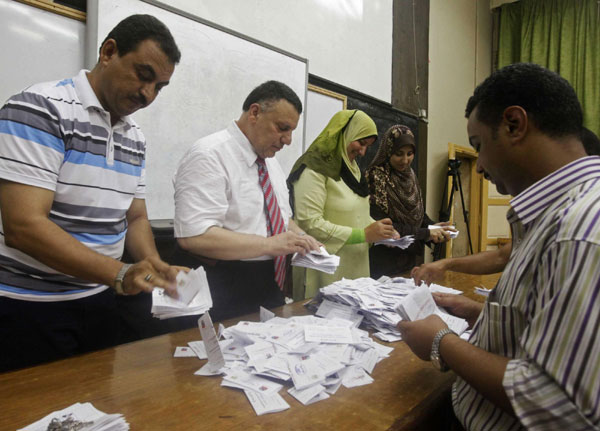Egypt completes presidential run-off
Updated: 2012-06-18 08:15
(Xinhua)
|
|||||||||||
CAIRO - Egyptians wrapped up their presidential run-off vote on Sunday with a seemingly moderate turnout.
 |
|
Electoral workers count ballots during the second day of voting in Egypt's presidential election, at a polling station in Cairo June 17, 2012. [Photo/Agencies] |
Sunday's voting was extended two hours to end at 10 pm (2000 GMT). Some polling stations saw many voters by Sunday evening.
The two-day fierce run-off was between Muslim Brotherhood's Mohamed Morsi and former prime minister Ahmed Shafiq. No one could predict who the winner will be until the counting of votes were completed.
Prime Minister Kamal el-Ganzouri went to some polling stations and urged citizens to vote. Senior military officials also inspected some areas.
The results will be officially announced on Thursday by the electoral commission. But the results may be known unofficially as early as Monday because of the distribution of observers of the two candidates in polling stations across the country.
The run-off came just two days after the Supreme Constitutional Court voided the Islamists-dominated People's Assembly (lower house of parliament) as the parliament election law was unconstitutional. The same court also ruled the political isolation law targeting former regime officials unconstitutional, ending the debate over Shafiq's qualification.
The new president will assume office without a new constitution and parliament. The Supreme Council of the Armed Forces (SCAF) reportedly will issue a supplementary constitutional declaration to make arrangements for the coming period.
The ruling military council took over power in February 2011, after Hosni Mubarak was forced to resign under pressure of 18 days of mass protests against his 29-year rule. The constitution was suspended and the parliament was dissolved shortly after Mubarak's fall.
From last November to February, Egyptians elected two houses of the parliament. Islamist parties occupied more than 70 percent of the seats in both chambers.
Related Stories
Egypt transition in turmoil on eve of runoff election 2012-06-16 10:30
Egypt's court says voting system unconstitutional 2012-06-07 09:15
Today's Top News
President Xi confident in recovery from quake
H7N9 update: 104 cases, 21 deaths
Telecom workers restore links
Coal mine blast kills 18 in Jilin
Intl scholarship puts China on the map
More bird flu patients discharged
Gold loses sheen, but still a safe bet
US 'turns blind eye to human rights'
Hot Topics
Lunar probe , China growth forecasts, Emission rules get tougher, China seen through 'colored lens', International board,
Editor's Picks

|

|

|

|

|

|





